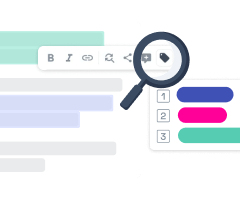
Research Democratization: Reframing the Conversation - from Training to Decision-Making
Organizations' appetite for UX research has grown over the past few years. Stakeholders and leaders are becoming more aware of the need to have research as a capability within their companies. However, the appetite to build a research discipline isn’t always matched with a comparable level of investment. This misalignment has led to the conversation surrounding research democratization – scaling UXR skills by training non-researchers to become apprentice researchers.
This has been a contentious discussion for a while now. The research community is divided by the topic. Some see this as a devaluation of the profession; others see it as an opportunity to build awareness and do more with less.
As a UX research manager involved in leading democratization efforts in 2 companies, I can see both sides of the argument. However, in my experience, there is no one size fits all approach. Company culture and UX design maturity play a big part in the success of these efforts.
In the following article, I unpack the argument surrounding democratization by surfacing stories from the industry and my own experiences. My goal is to help guide those thinking about embarking on a democratization effort by asking them to think more broadly about the long-term goals of the research practice within their organization.
- The benefits of training non-researchers
- #1 Helps build a culture of evidence-based decision-making
- #2 Team members become advocates for research findings and practices
- #3 Frees up the UXR team to focus on higher-impact work
- The challenges with training non-researchers
- #1 Higher risk of generating poor-quality insights
- #2 Not all non-researchers make good researchers
- #3 Non-researchers are not incentivized to prioritize learning
- #4 The ability to use research software does not equal research skill
- Making the decision to democratize
- Reframing the democratization argument
- Creating access to quality insights
- Take away
#1 Helps build a culture of evidence-based decision-making
Teams exposed to good research practices are better equipped to generate, internalize, and interpret research findings. Building these research muscles helps expand the dialogue and elevate the practice – creating a culture of evidence-based decision-making. I’ve experienced varied success levels here, largely dependent on the level of support from leadership to train non-researchers and the commitment from the non-researchers to immerse themselves in learning new skills.
#2 Team members become advocates for research findings and practices
Teams that immerse themselves in the research practice become advocates not only for their research findings and amplifying these through the organization but also for the nuances in the craft within good research: methods, planning, recruitment, and synthesis rigor. For example, when supporting multi-disciplinary teams running both generative and evaluative studies, I witnessed people become instantly more interested in research best practices and develop a deeper respect for the practice.
#3 Frees up the UXR team to focus on higher-impact work
Not all research questions have the same level of risk or ambiguity and therefore require the same level of skill. A common approach for organizations with limited research experience is to offload the low-risk work to non-research team members. For example, I’ve helped non-researchers run narrowly defined usability tests informed by prior generative research.
If you’re unsure about your project's risk level, Jeanette Fuccella outlines a framework for assessing research risk and problem clarity.
#1 Higher risk of generating poor-quality insights
Training non-researchers is a very attractive solution when you have a resource-constrained team trying to move quickly. However, organizations that ask amateur researchers to provide insights without the appropriate level of oversight run the risk of generating poor-quality insights. Poor UXR rigor and low-quality insights can erode trust in a UXR practice or lead to poor decision-making.
For example, teams are more likely to make mistakes without a thorough training program and the right level of oversight. Here are a few examples of where things can go wrong:
Selecting methods that aren’t suitable for the research question.
Conducting evaluative studies in place of generative studies.
Not recognizing unchecked biases.
#2 Not all non-researchers make good researchers
Generally speaking, researchers are uniquely equipped to empathize deeply, check their biases, navigate ambiguity, and cultivate curiosity. Unfortunately, these traits don’t come naturally to everyone.
For example, extensive synthesis work can be daunting for new researchers. Making sense of vast amounts of unstructured data is challenging, and it’s not uncommon for amateur researchers to find themselves in analysis paralysis. Another issue I’ve experienced with non-researchers doing synthesis is that they are uncomfortable with the ambiguity that sense-making can involve. As a result, they are prone to synthesizing findings with their own confirmation bias – looking only for insights that support their existing ideas.
Saswati Saha Mitra, Research Director at WhatsApp, has some very insightful learnings to share about her efforts to democratize research. She spent 1.5 years developing a Research Champions program to train non-researchers, only to learn that:
„While a lot of people can ‘talk’ to people; not many of them had the appetite to adapt to the craft of research — creating the hypothesis, writing the research guide, or thinking about an analysis framework. In almost 100% of the cases, our teams could not analyze the whole data effectively or left out lots of things to make the final analysis, synthesis, and storytelling manageable.“

#3 Non-researchers are not incentivized to prioritize learning
Product teams (especially in a startup environment) are famous for moving quickly and being scrappy, and when it comes to research democratization, the incentives don’t align.
When starting a research practice, I’ve found that designers and product managers show a lot of enthusiasm for learning and joining listening sessions in the beginning. However, it doesn’t take long before they realize they don’t have time to fully invest in the craft (on top of their day-to-day responsibilities).
Furthermore, democratization efforts don’t offer official incentives for non-researchers to become researchers. Team members are measured and compensated based on their core job function, which means research learning gets deprioritized. It’s unfair to ask people to take on two roles.
#4 The ability to use research software does not equal research skill
In my experience, it’s not uncommon for people to conflate good research with access to research software. This can lead to pressure from leadership to train non-researchers in research tools to upskill the team. Templates and software are tools that support experienced researchers to move faster, but it’s misguided to assume they will replace the skill of an experienced researcher.
Making the decision to democratize
So with all this said, what approach should you take?
I’m a strong believer in helping people explore other disciplines and build hybrid skill sets. However, the decision to train non-researchers needs to be entered into with positive intent and as part of a larger plan.
For example, this might be:
Helping team members from other disciplines make a career transition to user research by getting buy-in from leadership on how many hours a week they will dedicate to the practice and setting expectations on when they will transition to the research function.
Partnering with and training non-researchers to help you scale your efforts in the short term as you build up your hiring pipeline.
Running lunch and learns or short educational programs to build awareness in, and advocacy for research throughout the organization. But not to hand over full research responsibility to these teams.
It’s not a reliable strategy to ask non-researchers to carry the practice of research throughout an organization long-term. Also, in my experience, the level of UX maturity greatly impacts how successful your democratization efforts will be. The enthusiasm for more research doesn’t always translate to a mature product organization. Nor does it always go hand in hand with a better understanding of the value of UXR.
Here are some questions to ask yourself before you get started:
Does the organization have a culture of evidence-based decision-making, or are they willing to change how they work?
Does the current team have prior research experience or interest in learning?
Are they willing to budget time for UXR in project timelines?
Is leadership willing to invest in research practice: software, incentives, time for training, and budget for hiring (within 6 months)?
Does leadership understand how this affects the responsibilities and bandwidth of the team members?
The following framework is a quick start guide to help you navigate the outcomes of the questions above.

Reframing the democratization argument
The conversation about democratization has centered around the argument for training non-researchers. However, I want to propose an alternate view…
If “democratization” means: “the action of making something accessible to everyone,” have we confused the goal of making UXR skills accessible with making insights and data accessible?
The goal of democratization shouldn’t be to transform stakeholders or team members into apprentice researchers. Organizations that treat this as a long-term solution run the risk of scaling poor research practices and generating misleading insights. Instead, the goal of democratization should be to guide the organization to better decision-making through a better understanding of the problem space and end user.
Let’s change the conversation by putting the emphasis back on democratizing access to quality UXR insights.
Creating access to quality insights
The following are techniques I’ve found helpful when socializing research insights throughout an organization.
Exposure hours/ listening sessions - invite team members to ‘sit in’ on live research sessions or listen to recorded research interviews, customer service calls, etc.
Shadowing program - design a program where people across the organization can observe staff members.
Workshops - synthesis workshops or work sessions are a great way to immerse the team in the raw data.
Socialization strategies - share insights in a format and channel that aligns with the organization's culture. Presentations, interactive sessions, lunch and learns, quizzes, newsletters, insight nuggets, and full reports.
Repository - build a central archive of research reports and raw findings for the organization to self-serve.






